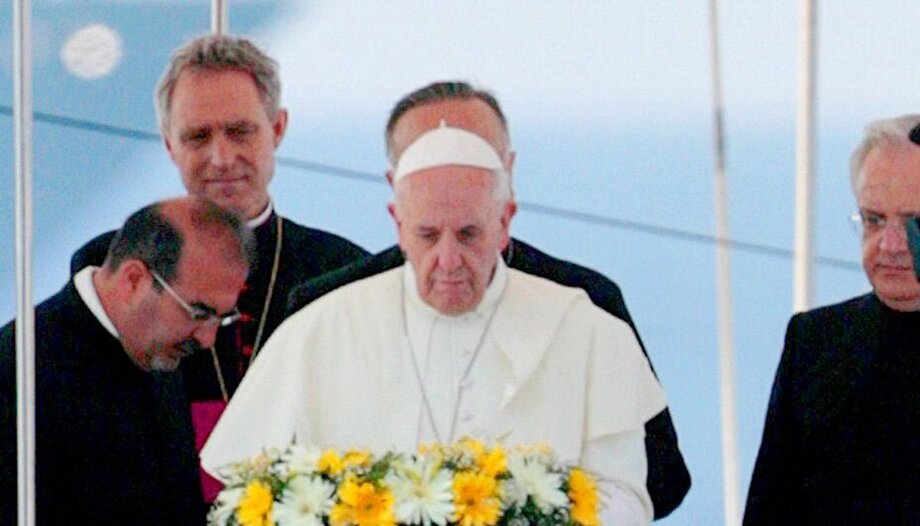"At last they embarked. My grandparents managed to sell their meager possessions in the Piedmont countryside and arrived at the port of Genoa to set sail on the Giulio Cesare with a one-way passage." Thus begins the Pope's autobiography. For him, immigration is not only a social issue but a personal experience. "I am the son of immigrants", "I know what immigration is because that is how my family was formed", he says in his book "Hope never disappoints".
Immigration is not a matter of figures or statistics, of reports or files, but of faces, names and concrete stories. He looked into the eyes of the immigrants in Lampedusa in 2013, in the Moria refugee camp in Lesbos in 2016 and 2021, to the Rohingya refugees in Bangladesh in 2017 and has looked into the eyes of every suffering immigrant anywhere in the world.
For as long as man has been man, he has migrated, reflecting the pilgrim dimension of existence. Today, however, immigration is associated with violence, exploitation, human trafficking, cruelty and death. We are witnessing, he says, the greatest movement of people and peoples of all time, and history will judge us by how we behave in the face of this phenomenon that affects us all and from which no one can ignore. It is a crucial issue that either wrecks us as a civilization or becomes an opportunity for a paradigm shift. His cry is clear: We cannot go on like this, with the globalization of indifference! We must initiate a new stage, the globalization of charity and the civilization of love.
Anthropological and theological foundations
In his vision of immigration, Francis starts from a double foundation: anthropological and theological. According to the former, what is at stake is human dignity, which is sacred. The criterion for judging and acting cannot be welfare but the safeguarding of human dignity. The treatment of immigrants must be in accordance with their infinite and inalienable dignity. And according to the theological foundation, it is not Christian to disregard the immigrant but to welcome him and love him as another Christ because in the end we will be judged by this: "I was an immigrant and you welcomed me" (Mt 25:35).
From the parable of the Good Samaritan (Lk 10:25) Francis affirms, there are only two types of people: those who take on the pain or those who pass by. This is the present challenge: either we pass by or we carry one another on our shoulders ("Fratelli Tutti" n. 70).
For Francis, the first thing is to see the reality of this drama in the countries of origin, where civil wars prevail, fueled by selfishness and exploited by arms industries, where violence takes countless human lives, where climate change and environmental disasters do not allow people to live in dignity, where they live in misery and suffer the painful consequences of an economy that kills. But all these causes are not beyond human control. We can have hope.
Personal and political response
The solution to the problem must be at the individual and political level. At the individual level, God asks each one of us: Where are you? Where is your brother? God asks us to be responsible for each other. In the face of this drama, we have lost the sense of fraternal responsibility, we do not cry for the suffering of others, we have become accustomed to it and we take refuge in anonymity. Francis invites us to shake off our indifference.
At the political level, the first step is to help the countries of origin through cooperation and solidarity, creating new conditions that allow people to live with dignity, help economic growth, and offer young people opportunities for the future that do not force them to leave. This requires the collaboration of all the countries concerned: countries of origin, transit and destination, and implies that the most developed countries abandon the "neo-colonizing" economic practices of extracting and exploiting the resources of the poorest. The second step will be to guarantee legal access to destination countries as the only way to defeat human traffickers.
The four verbs
Four verbs are the ones the Pope used in the World Day of Migrants 2018 to articulate an adequate response to the migration issue: welcome, protect, promote and integrate. To "welcome" means to open the doors according to the capacity of each country by facilitating the means for an entry in conditions: visas, to stop deportations, to guarantee assistance. "Protect" implies putting the person at the center and defending his or her rights. To "promote" means to encourage their personal development in the country of destination, to help them in their language, civic and work training and education. And finally, "integrating" means mixing, living together, enriching and respecting each other. It will be future generations, in the long term, who will judge whether this process has been carried out fairly.
Hope is the key. By hope, those men and women left their land in search of a better future. With hope, we can solve the problem because overcoming its causes depends on us. Pope Francis has set himself up as a defender of this hope that cannot possibly die. It is the smallest virtue, the "little hope", which he promised to follow forever because his heaven is already on earth.
Professor of Social Doctrine of the Church at CEU Cardenal Herrera University.









